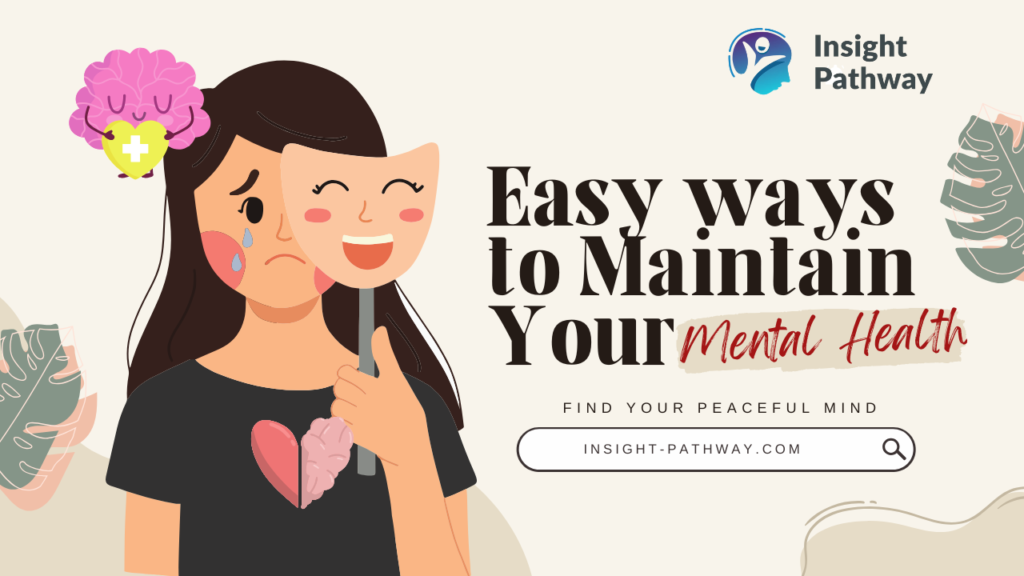Your total well-being is based on your mental health, which influences your thoughts, emotions, and ability to deal with life’s obstacles. It is more crucial than ever to preserve excellent mental health in the fast-paced world of today.
If you’re wondering how to improve your mental health effectively, these five proven strategies can help you lead a more balanced and fulfilling life.

Practice Mindfulness Meditation
Mindfulness meditation is one of the most effective ways to boost mental health naturally. By focusing on the present moment without judgment, you can reduce stress, anxiety, and negative thinking patterns.
How to Get Started:
- Dedicate 5–10 minutes daily to meditation.
- Close your eyes, find a peaceful place to sit, and concentrate on your breathing.
- Bring your focus back to your breathing whenever your thoughts stray.
Mindfulness not only enhances emotional well-being but also improves your focus and resilience over time.
Stay Active with Regular Exercise
Physical activity is a powerful tool to improve your mental health. Exercise releases endorphins—natural chemicals that uplift your mood and reduce stress. It can also alleviate symptoms of anxiety and depression.
Simple Exercise Ideas:
- Take a brisk 30-minute walk outdoors.
- For emotional and physical relaxation, try yoga.
- Engage in activities you enjoy, like cycling, swimming, or dancing.
Remember, consistency is key. Even small amounts of daily movement can make a noticeable difference in your mental health.
3. Build and Strengthen Social Connections
Strong relationships are essential for mental health improvement. Engaging with others reduces feelings of isolation and boosts your sense of belonging and emotional support.
Ways to Strengthen Your Social Network:
- Plan frequent in-person or virtual get-togethers with friends and family.
- Join a club or group that aligns with your hobbies and interests.
- Volunteer in your community to meet like-minded people.
Quality relationships enrich your life and create a support system to navigate challenging times.
4. Develop a Consistent Sleep Routine
Good sleep is one of the most underrated strategies for improving mental health. Poor sleep affects your mood, focus, and ability to cope with stress, while quality rest rejuvenates both your body and mind.
Tips for Better Sleep:
- Maintain a regular sleep pattern, even on the weekends.
- Establish a calming sleep ritual, like reading or practicing meditation.
- A minimum of one hour before bed, stay away from devices to minimise your exposure to blue light.
- Keep your bedroom cool, dark, and quiet.
- By prioritizing sleep, you’ll notice improvements in your energy, concentration, and emotional well-being.
5. Practice Daily Gratitude
Gratitude is a simple but transformative way to enhance emotional well-being. Focussing on your blessings can help you feel happier, less stressed, and have a more positive attitude on life.
How to Practice Gratitude:
- Write down three things you’re grateful for each day in a journal.
- Share your gratitude with someone close to you.
- Reflect on positive moments from your day before going to bed.
Cultivating gratitude helps reframe challenges and keeps you focused on life’s positive aspects.
Bonus Tip – Seek Professional Help When Needed
While these strategies are powerful, there’s no shame in seeking professional help. If you’re feeling overwhelmed, a licensed therapist or counselor can provide personalized guidance to support your journey toward better mental health.
Conclusion
Improving your mental health doesn’t have to be complicated. By incorporating these five proven strategies—mindfulness meditation, exercise, social connections, sleep, and gratitude—into your daily routine, you’ll be well on your way to a healthier, happier mind.
Remember, small changes can lead to big results. Be patient with yourself, and don’t hesitate to seek professional help if needed. Begin your path now and enjoy the advantages of improved mental health for a more satisfying existence.




